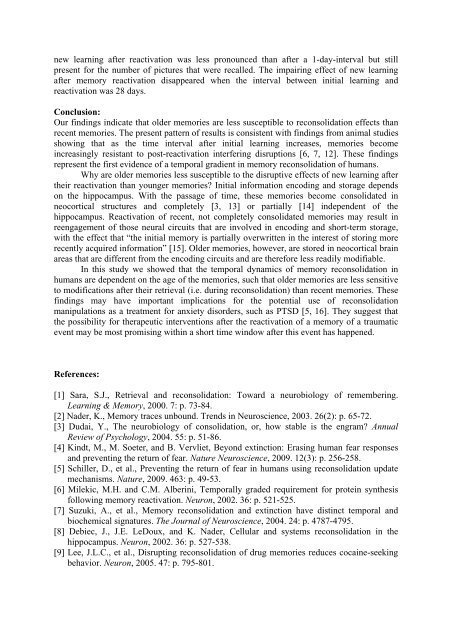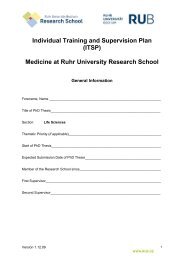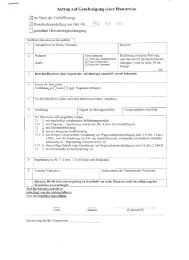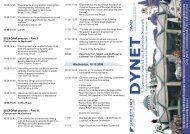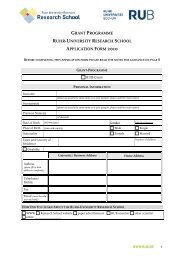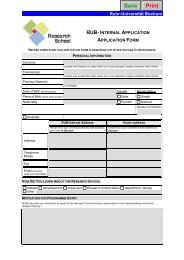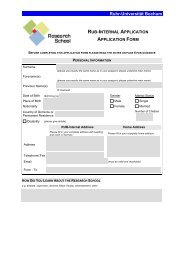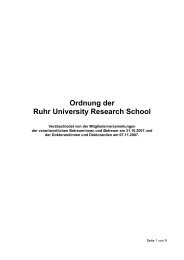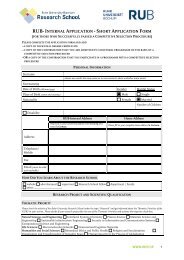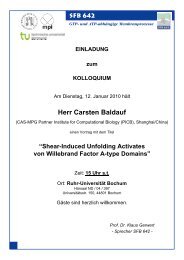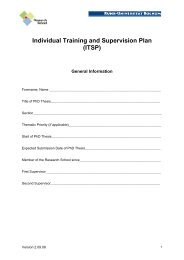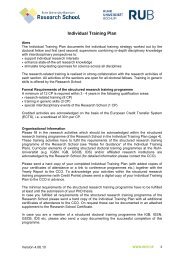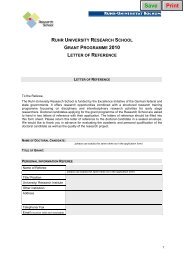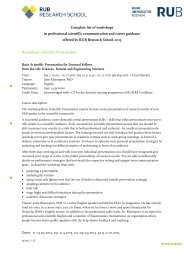Section Days abstract book 2010.indd - RUB Research School ...
Section Days abstract book 2010.indd - RUB Research School ...
Section Days abstract book 2010.indd - RUB Research School ...
Create successful ePaper yourself
Turn your PDF publications into a flip-book with our unique Google optimized e-Paper software.
new learning after reactivation was less pronounced than after a 1-day-interval but still<br />
present for the number of pictures that were recalled. The impairing effect of new learning<br />
after memory reactivation disappeared when the interval between initial learning and<br />
reactivation was 28 days.<br />
Conclusion:<br />
Our findings indicate that older memories are less susceptible to reconsolidation effects than<br />
recent memories. The present pattern of results is consistent with findings from animal studies<br />
showing that as the time interval after initial learning increases, memories become<br />
increasingly resistant to post-reactivation interfering disruptions [6, 7, 12]. These findings<br />
represent the first evidence of a temporal gradient in memory reconsolidation of humans.<br />
Why are older memories less susceptible to the disruptive effects of new learning after<br />
their reactivation than younger memories? Initial information encoding and storage depends<br />
on the hippocampus. With the passage of time, these memories become consolidated in<br />
neocortical structures and completely [3, 13] or partially [14] independent of the<br />
hippocampus. Reactivation of recent, not completely consolidated memories may result in<br />
reengagement of those neural circuits that are involved in encoding and short-term storage,<br />
with the effect that “the initial memory is partially overwritten in the interest of storing more<br />
recently acquired information” [15]. Older memories, however, are stored in neocortical brain<br />
areas that are different from the encoding circuits and are therefore less readily modifiable.<br />
In this study we showed that the temporal dynamics of memory reconsolidation in<br />
humans are dependent on the age of the memories, such that older memories are less sensitive<br />
to modifications after their retrieval (i.e. during reconsolidation) than recent memories. These<br />
findings may have important implications for the potential use of reconsolidation<br />
manipulations as a treatment for anxiety disorders, such as PTSD [5, 16]. They suggest that<br />
the possibility for therapeutic interventions after the reactivation of a memory of a traumatic<br />
event may be most promising within a short time window after this event has happened.<br />
References:<br />
[1] Sara, S.J., Retrieval and reconsolidation: Toward a neurobiology of remembering.<br />
Learning & Memory, 2000. 7: p. 73-84.<br />
[2] Nader, K., Memory traces unbound. Trends in Neuroscience, 2003. 26(2): p. 65-72.<br />
[3] Dudai, Y., The neurobiology of consolidation, or, how stable is the engram? Annual<br />
Review of Psychology, 2004. 55: p. 51-86.<br />
[4] Kindt, M., M. Soeter, and B. Vervliet, Beyond extinction: Erasing human fear responses<br />
and preventing the return of fear. Nature Neuroscience, 2009. 12(3): p. 256-258.<br />
[5] Schiller, D., et al., Preventing the return of fear in humans using reconsolidation update<br />
mechanisms. Nature, 2009. 463: p. 49-53.<br />
[6] Milekic, M.H. and C.M. Alberini, Temporally graded requirement for protein synthesis<br />
following memory reactivation. Neuron, 2002. 36: p. 521-525.<br />
[7] Suzuki, A., et al., Memory reconsolidation and extinction have distinct temporal and<br />
biochemical signatures. The Journal of Neuroscience, 2004. 24: p. 4787-4795.<br />
[8] Debiec, J., J.E. LeDoux, and K. Nader, Cellular and systems reconsolidation in the<br />
hippocampus. Neuron, 2002. 36: p. 527-538.<br />
[9] Lee, J.L.C., et al., Disrupting reconsolidation of drug memories reduces cocaine-seeking<br />
behavior. Neuron, 2005. 47: p. 795-801.


